History
 They say that children learn what they live, and we all know that is true in many ways. What I find interesting is that when there is a family that has political ties, often they extend way back. Of course, with new people being introduced into the family with marriages and births, things can change, and move away from the ties that had been there before, but often they continue on for generations. That is the case in the Knox family, which is one of the families my husband, Bob comes from. His mom and grandparents were very much not political, but in generations past, there were several presidents in his family, with the one most well known to us being James Knox Polk, who is Bob’s 2nd cousin 5 times removed. I know that is pretty distant, but then, he lived from 1795 to 1849, so it would have to be.
They say that children learn what they live, and we all know that is true in many ways. What I find interesting is that when there is a family that has political ties, often they extend way back. Of course, with new people being introduced into the family with marriages and births, things can change, and move away from the ties that had been there before, but often they continue on for generations. That is the case in the Knox family, which is one of the families my husband, Bob comes from. His mom and grandparents were very much not political, but in generations past, there were several presidents in his family, with the one most well known to us being James Knox Polk, who is Bob’s 2nd cousin 5 times removed. I know that is pretty distant, but then, he lived from 1795 to 1849, so it would have to be.
There are also, the presidents who are a little more distant, but still come from the Knox family. Presidents like Andrew Jackson, George HW Bush, and George W Bush. The  connections are a little harder to find, because they involve the in-laws and their marriages, but they are nevertheless a familial connection. I suppose that if we go far enough back, we will find a president or some royalty in pretty much every family. It stands to reason when you consider the various family connections. As marriages and births occur, and family connections are formed, it becomes more and more a real possibility. For some of us, like Bob’s family’s political ties, and my family’s tie to Princess Diana and the British Royal Family, the connections are well known to us from the time we are children. For others, those connections are not discovered until much later on, and some never know that a connection exists. To me that is sad, because I have thoroughly enjoyed finding out who I am related to…and I have been very surprised too. Both Bob and I are related to Princess Diana and her children, so the birth of Prince George was particularly exciting to me. Even though the royal family is not exactly a political tie in the normal sense of the word, they are still the ruling family in England, and so political in that way.
connections are a little harder to find, because they involve the in-laws and their marriages, but they are nevertheless a familial connection. I suppose that if we go far enough back, we will find a president or some royalty in pretty much every family. It stands to reason when you consider the various family connections. As marriages and births occur, and family connections are formed, it becomes more and more a real possibility. For some of us, like Bob’s family’s political ties, and my family’s tie to Princess Diana and the British Royal Family, the connections are well known to us from the time we are children. For others, those connections are not discovered until much later on, and some never know that a connection exists. To me that is sad, because I have thoroughly enjoyed finding out who I am related to…and I have been very surprised too. Both Bob and I are related to Princess Diana and her children, so the birth of Prince George was particularly exciting to me. Even though the royal family is not exactly a political tie in the normal sense of the word, they are still the ruling family in England, and so political in that way.

I suppose that things can come full circle too, from a very political family to one that is not so political, and back to very political again. And in that way, I would certainly be one of the latter…and possibly the most politically inclined member of the current family…at least for the Knox/Schulenberg side. I doubt if anyone would dispute that. I have no intentions of running for political office. I might be considered more of an activist, in that I have very specific ideas of right and wrong, and I certainly don’t mind voicing my opinions on matters, as my friends can fully attest. What can I say, except that it takes all kinds of people to make this world what it is.
 Every so often in the royal family, someone enters the royal scene, who single handedly manages to breathe new life into an otherwise stale lineage that has been filled with people who have been in the family so long that they possess little or no…well, zing!! Kate Middleton is this generation’s breath of fresh air. Don’t get me wrong, because I very much like Prince William and Prince Harry, and I feel that both of them have gone a long way toward making the British Royal Family popular and accessible to a large degree, but they were, nevertheless caught up in the humdrum, and even a little bit tired, feel that the Royal Family has exhibited in recent years. Kate on the other hand, has a smile that lights up the room when she appears. She is vibrant and full of life, and she is not shy or afraid of the camera, so she has captured our imaginations and our hearts for a while now. From the time they started dating, we hoped that she would be the one Prince William would choose, because when they were together, he changed into a vibrant, smiling
Every so often in the royal family, someone enters the royal scene, who single handedly manages to breathe new life into an otherwise stale lineage that has been filled with people who have been in the family so long that they possess little or no…well, zing!! Kate Middleton is this generation’s breath of fresh air. Don’t get me wrong, because I very much like Prince William and Prince Harry, and I feel that both of them have gone a long way toward making the British Royal Family popular and accessible to a large degree, but they were, nevertheless caught up in the humdrum, and even a little bit tired, feel that the Royal Family has exhibited in recent years. Kate on the other hand, has a smile that lights up the room when she appears. She is vibrant and full of life, and she is not shy or afraid of the camera, so she has captured our imaginations and our hearts for a while now. From the time they started dating, we hoped that she would be the one Prince William would choose, because when they were together, he changed into a vibrant, smiling  man too. She had that affect on him, and I’m sure that feeling of being alive again was the main reason Prince William could look no further for his bride. Yes, he was concerned for her emotional wellbeing, after the terrible time his mother had as a member of the Royal family, and so he gave her some space, but they could not stay apart, and the British Monarchy is far better because of their marriage.
man too. She had that affect on him, and I’m sure that feeling of being alive again was the main reason Prince William could look no further for his bride. Yes, he was concerned for her emotional wellbeing, after the terrible time his mother had as a member of the Royal family, and so he gave her some space, but they could not stay apart, and the British Monarchy is far better because of their marriage.
Now that their little family has grown with the addition of precious little Prince George, there is even more life being breathed into the family. While we haven’t been treated to a lot of pictures of Prince George yet, it is hard to get that cute little face out of your memory. He is such a handsome little man, and I am so happy for the royal couple. While I don’t expect it to be very long before we find out that another royal baby is on the way, for now, we will just have to wait patiently for more views of the current royal little one.

I think the main reason Princess Kate was able to bring about such a royal transformation is that she was not raised in all the stuffiness of the British Hierarchy, but rather was a commoner, and so the best choice to bring a much needed change. She may be a commoner, but it is in standing only, because she has style and flair, beauty and brains, and definitely grace. She is in every way…a princess. I think the Queen would do very well to pass up Charles in favor of Prince William and his bride, Kate for King and Queen of England…and that is my opinion on the matter. Today is my cousin, Princess Kate’s birthday!! Happy birthday Princess Kate!! Have a wonderful day!! We love you!!
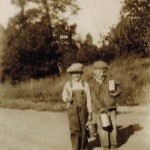 When my girls were little, they rode the bus to school, and of course, ate their lunch at school too. As a kid, we only lived 5 blocks from school, and since Mom didn’t work then, we went home for lunch. In days gone by, the kids walked into town to school. There was not time for them to come home for lunch…only the town kids could do that. You wouldn’t think that these situations have much in common, but the thing they do have in common is the lunch container…so to speak. When my girls were little, their first lunch box was the Strawberry Shortcake lunchbox. They loved it. And every year after that, they got a new lunchbox, because as we all know, a first grader can’t have a Strawberry Shortcake lunchbox. That is totally not cool. By the first grade you would need something cool, like Care Bears or My Little Pony. The right lunch box made that first day of school, and the wrong one, ruined it. Ok, maybe it wasn’t quite that serious, but we all
When my girls were little, they rode the bus to school, and of course, ate their lunch at school too. As a kid, we only lived 5 blocks from school, and since Mom didn’t work then, we went home for lunch. In days gone by, the kids walked into town to school. There was not time for them to come home for lunch…only the town kids could do that. You wouldn’t think that these situations have much in common, but the thing they do have in common is the lunch container…so to speak. When my girls were little, their first lunch box was the Strawberry Shortcake lunchbox. They loved it. And every year after that, they got a new lunchbox, because as we all know, a first grader can’t have a Strawberry Shortcake lunchbox. That is totally not cool. By the first grade you would need something cool, like Care Bears or My Little Pony. The right lunch box made that first day of school, and the wrong one, ruined it. Ok, maybe it wasn’t quite that serious, but we all  know that for a kid, very specific things mattered in school.
know that for a kid, very specific things mattered in school.
Things were a little different in the old west, as well as in the early 1900’s. Fancy lunchboxes didn’t exist. Instead of a lunchbox, the children took their lunch to school in a lunch pail, and it was really a small pail. I remember watching the Little House on the Prairie shows and seeing the girls bringing their lunch to school. It seemed so primitive…like taking their lunch in the same container they might just as easily have played in the sand with. I don’t know if they purchased the pail for the purpose of taking their lunch to school in, or if the pail was purchased with something else in it, and then used for lunches when it was empty, or just how it came to be a lunch pail. Who thought of that idea? Was it someone, who like me, tries to find a use for things that just look like they are too good to throw away, and maybe something could be made from them? In researching this thought, I found that often the 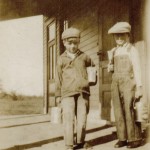 children would try to create a lunch pail out of the containers that biscuit mix came in, so I guess that kids have always wanted a fancy lunch box.
children would try to create a lunch pail out of the containers that biscuit mix came in, so I guess that kids have always wanted a fancy lunch box.
From what I read, the lunch box used to be a kind of low status symbol too…at least in the working world. The worker who carried his lunch was viewed as someone who could not afford a hot lunch at a restaurant. Thankfully that isn’t the way it is view now, because I know a lot of people who bring their lunch to work. For most of us these days, it is more a way to eat healthy, and avoid the fast food places. So in that way, I guess the status symbol has taken on a whole new meaning.
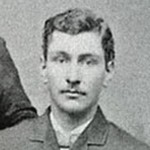 As I continue to read about my Great Great Aunt Tessie, Teresa Elizabeth Spencer Davis, I continue to be amazed at the kind of people she and her husband, William Jonathan Davis were. They raised nine children, losing a set of twins at birth, which would have made eleven children. Aunt Tessie would go on to outlive seven of her eleven children, passing away on April 21, 1944 at the age of 79 years. Her husband, William, who had been raised on the high seas, after losing both of his parents by the time he was seven, and then his Uncle Walter stepped up to raise him and his brother on his merchant ship, passed away on August 11, 1925 at the age of 69 years, having been proceeded in death by five of his children.
As I continue to read about my Great Great Aunt Tessie, Teresa Elizabeth Spencer Davis, I continue to be amazed at the kind of people she and her husband, William Jonathan Davis were. They raised nine children, losing a set of twins at birth, which would have made eleven children. Aunt Tessie would go on to outlive seven of her eleven children, passing away on April 21, 1944 at the age of 79 years. Her husband, William, who had been raised on the high seas, after losing both of his parents by the time he was seven, and then his Uncle Walter stepped up to raise him and his brother on his merchant ship, passed away on August 11, 1925 at the age of 69 years, having been proceeded in death by five of his children.
In life they were a well known and much respected couple in the community of Rushville, Nebraska. One of their prized possessions was a genuine Surrey with the fringe around the top, and a driving team of high spirited Sorrel horses. They were active in the community literary, debates, Sunday School, picnics, and Fourth of July celebrations at Palmer’s Grove. They were members of modern woodman and royal neighbors. William served on school and election boards, was elected Justice of the Peace, performed a marriage ceremony, and helped bury several people, acting as both mortician and preacher, He was supervisor of the Magnesium Road built north of the Colclessor Bridge. They were often called to neighbors homes in times of sickness and emergencies. The young son of Emile Sandoz, called them when his father was shot. William gave first aid until the doctor arrived, then formed a posse to help run down the killer. People traveling by team and wagon from the South Sandhills spent many nights in their home and were always welcome. They also allowed many peddlers to 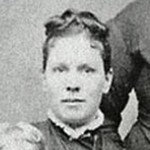 stay at their home, and the peddlers always left a gift as a token of their appreciation.
stay at their home, and the peddlers always left a gift as a token of their appreciation.
They were all gifted musicians. Aunt Tessie played the organ and sang beautifully. The children played the organ, violin, accordion, mouth harp, horns, and drums. In fact, they formed an orchestra and played at dances all over the area. They even had an organ that could be folded up like a valise in the back of a buggy. They often traveled miles to play all night until dawn. I don’t know about you, but their life wears me out, just thinking about it, much less living it, but to them, it just seemed like the normal way to live.
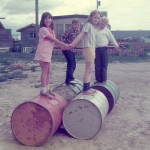 Kids have always tried to use things around them as props in their games. Things like boxes, barrels, and even a little taller hill become the prop of the day. When I saw this picture of Bob’s brother, Ron, his cousins, Danny and Sandy, and a neighbor girl playing on four oil drums, all I could think was “Roll out the barrel, and we’ll have a barrel of fun.” Of course, that is the “Beer Barrel Polka” song, which was composed by the Czechoslovakian musician Jaromír Vejvoda in 1927, and really had nothing to do with a child’s game at all, but the words seemed so fitting in the case of the game the kids were obviously playing. The barrels must have either had something in them, or been pretty heavy in their own right, because it doesn’t appear that they wanted to roll around on the kids. Still, in my imagination, I could see them racing down the driveway to see who would get to the finish line first. It doesn’t really matter what they were doing with the barrels, because it is obvious that they thought being up on them was great fun. If they looked back now, they would probably wonder how such an inanimate object, with no moving parts and no flashing lights, could possibly have held their interest, but you must understand that their childhood was a time of no computers, cell phones, or video games…at least for a few more years, so they used their imaginations to have fun.
Kids have always tried to use things around them as props in their games. Things like boxes, barrels, and even a little taller hill become the prop of the day. When I saw this picture of Bob’s brother, Ron, his cousins, Danny and Sandy, and a neighbor girl playing on four oil drums, all I could think was “Roll out the barrel, and we’ll have a barrel of fun.” Of course, that is the “Beer Barrel Polka” song, which was composed by the Czechoslovakian musician Jaromír Vejvoda in 1927, and really had nothing to do with a child’s game at all, but the words seemed so fitting in the case of the game the kids were obviously playing. The barrels must have either had something in them, or been pretty heavy in their own right, because it doesn’t appear that they wanted to roll around on the kids. Still, in my imagination, I could see them racing down the driveway to see who would get to the finish line first. It doesn’t really matter what they were doing with the barrels, because it is obvious that they thought being up on them was great fun. If they looked back now, they would probably wonder how such an inanimate object, with no moving parts and no flashing lights, could possibly have held their interest, but you must understand that their childhood was a time of no computers, cell phones, or video games…at least for a few more years, so they used their imaginations to have fun.
The same applies to the game “King of the Hill”, which was of course to see who could dominate the hill and keep everyone else from being able to get up it. Of course, I don’t think that is exactly what my Aunt Laura and her friend were playing either, but it did, nevertheless 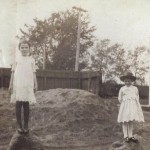 appear that Aunt Laura had managed to acquire the taller of the two little hills, thus making her the King…so to speak. Whatever the game was that the girls were playing, the two little hills figured into it enough to make my grandmother want to take their picture as a memory of the occasion. Here again, the girls had used the things available to them to make for a day of fun. Kids used to be able to do that. Without video games and texting, and with parents who didn’t let them watch television all day, or without television at all, the imagination was the way to have fun. It really seems to be a lost art today. Kids don’t used their imaginations much these days, because all the stuff in their head is fed in electronically. That’s really quite sad, when you think about it.
appear that Aunt Laura had managed to acquire the taller of the two little hills, thus making her the King…so to speak. Whatever the game was that the girls were playing, the two little hills figured into it enough to make my grandmother want to take their picture as a memory of the occasion. Here again, the girls had used the things available to them to make for a day of fun. Kids used to be able to do that. Without video games and texting, and with parents who didn’t let them watch television all day, or without television at all, the imagination was the way to have fun. It really seems to be a lost art today. Kids don’t used their imaginations much these days, because all the stuff in their head is fed in electronically. That’s really quite sad, when you think about it.
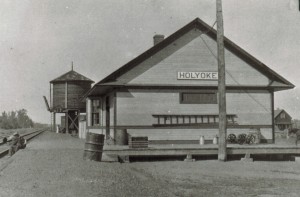 My dad’s family spent quite a few years living in the small town of Holyoke, Minnesota. The area is wooded and very beautiful, with the train tracks bordering the edge of town. As boys, my dad and my Uncle Bill were always fascinated by the trains. I think that is probably very normal for all boys, and especially this living in a small town. The trains become the highlight of the day. My husband, Bob loved to go out and count the cars on the train when
My dad’s family spent quite a few years living in the small town of Holyoke, Minnesota. The area is wooded and very beautiful, with the train tracks bordering the edge of town. As boys, my dad and my Uncle Bill were always fascinated by the trains. I think that is probably very normal for all boys, and especially this living in a small town. The trains become the highlight of the day. My husband, Bob loved to go out and count the cars on the train when 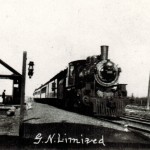 his family was living in the small town of Point of Rocks, Wyoming. I’m sure Dad and Uncle Bill did the same thing.
his family was living in the small town of Point of Rocks, Wyoming. I’m sure Dad and Uncle Bill did the same thing.
They knew the trains like a lot of guys know cars. Uncle Bill tells us in his family history that the first train is an early 1900’s 1500 Series Locomotive, and the second one is a 1910 1200 Series Locomotive that was used on passenger trains. I can imagine that they spent as much time talking to the employees of the railway as they did looking at the trains. Their curiosity was peeked and they wanted to know everything about those trains. Their dad worked for the Great Northern Railway too, so they were allowed to ride the trains to get to and from school…so any stories about how they walked 10 miles, in the snow, and it was uphill both ways, are 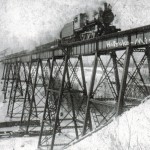 probably a little bit of a stretch.
probably a little bit of a stretch.
Uncle Bill actually got a job with the railroad one time but he didn’t keep it very long. He thought it was pretty boring work, and since I have had a few boring jobs myself, I can empathize with his thoughts on the matter. Maybe, if he had been doing work that was similar to what his dad did, he would have liked it better. While railroad work was not what they wanted to do, that did not dim their interest in the trains, but then, what else was there for two young boys to do in the small town of Holyoke, Minnesota. I never thought of them as small town boys, but maybe they were.
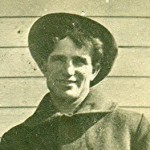 The Indian motorcycle came into being in 1901, and is noted as the first motorcycle in the United States. My grandfather, Allen Luther Spencer owned one, which he dubbed That Old Indian Motorcycle in the very early 1900’s. He decided to ride the motorcycle from Ladysmith, Wisconsin to Rushville, Nebraska to meet and visit his Aunt Tessie Spencer Davis. Because gas stations were few and far between, he would have to carry gas with him. Even then, there were times he ended up pushing the motorcycle to the next gas station, such as the point in South Dakota where he pushed it for quite a few miles after running it out of gas.
The Indian motorcycle came into being in 1901, and is noted as the first motorcycle in the United States. My grandfather, Allen Luther Spencer owned one, which he dubbed That Old Indian Motorcycle in the very early 1900’s. He decided to ride the motorcycle from Ladysmith, Wisconsin to Rushville, Nebraska to meet and visit his Aunt Tessie Spencer Davis. Because gas stations were few and far between, he would have to carry gas with him. Even then, there were times he ended up pushing the motorcycle to the next gas station, such as the point in South Dakota where he pushed it for quite a few miles after running it out of gas.
My Uncle Bill tells of a point in Nebraska, where his dad ran into a bunch of Indians, who invited him to supper. He wasn’t sure how the Indians felt about the white man at that point, so wanting to make sure he didn’t offend them, he accepted their offer. There were about a dozen Indians, with several horses and a bunch of dogs there. Indians had always had a bunch of dogs around, because they are a kind of self storing, self perpetuating food supply. The Indians picked out a rather plump dog, killed it and made a stew.
Now, I don’t know about you, but my mother always told me that when you are invited for a meal, you eat what is put in front of you. I know that  a lot of people have eaten things like snake or rabbit, and been told that it tasted just like chicken. I’ve eaten rabbit, and I do not agree. There is no similarity as far as I’m concerned. I have never eaten horse or dog meat, and I think I would have to be just about starving to death before I would consent to eat it…sorry Mom. Nevertheless, my grandfather had no desire to offend those Indians, so he ate the bowl of stew offered. After that, they offered him a second, third, and finally a fourth bowl. He pretended the stew was very good, while secretly praying they would not offer a fifth bowl. He really didn’t want to offend the men who far outnumbered him, and there was nowhere he could turn for help. Finally, they could tell that he was either very full, or maybe even a little green around the gills, so they decided that supper was over and after talking a while, they set up some tents and settled in for the night. Grandpa moved his motorcycle a little way away from their camp, and tried not to fall asleep, wanting to keep his scalp, and not knowing if they still scalped people or not. He finally fell asleep, in spite of his efforts not to, and in the morning the Indians were gone.
a lot of people have eaten things like snake or rabbit, and been told that it tasted just like chicken. I’ve eaten rabbit, and I do not agree. There is no similarity as far as I’m concerned. I have never eaten horse or dog meat, and I think I would have to be just about starving to death before I would consent to eat it…sorry Mom. Nevertheless, my grandfather had no desire to offend those Indians, so he ate the bowl of stew offered. After that, they offered him a second, third, and finally a fourth bowl. He pretended the stew was very good, while secretly praying they would not offer a fifth bowl. He really didn’t want to offend the men who far outnumbered him, and there was nowhere he could turn for help. Finally, they could tell that he was either very full, or maybe even a little green around the gills, so they decided that supper was over and after talking a while, they set up some tents and settled in for the night. Grandpa moved his motorcycle a little way away from their camp, and tried not to fall asleep, wanting to keep his scalp, and not knowing if they still scalped people or not. He finally fell asleep, in spite of his efforts not to, and in the morning the Indians were gone.
The rest of the trip was completed without further incident, and he made it to Aunt Tessie’s house, scaring her and her 7 year old daughter Ruth, when he came down the road as boldly 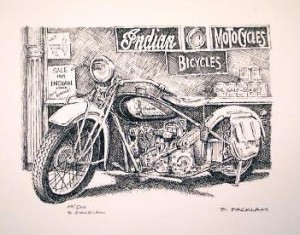 as you please. They were the only ones home, and they lived many miles from the nearest neighbor. After dismounting the motorcycle, he walked up to her front door, and when she answered, he said, “Aunt Tessie, I’m your nephew, Allen Spencer, from Wisconsin.” It was an unusual way to meet her nephew, and it might have helped if he had sent her a letter telling her he was coming, but they quickly got to know each other, and he spent several months with the family before heading back to Wisconsin. I would imagine it was a visit that Aunt Tessie never forgot.
as you please. They were the only ones home, and they lived many miles from the nearest neighbor. After dismounting the motorcycle, he walked up to her front door, and when she answered, he said, “Aunt Tessie, I’m your nephew, Allen Spencer, from Wisconsin.” It was an unusual way to meet her nephew, and it might have helped if he had sent her a letter telling her he was coming, but they quickly got to know each other, and he spent several months with the family before heading back to Wisconsin. I would imagine it was a visit that Aunt Tessie never forgot.
 Not every life is of a common type. Once in a while, circumstances come about that create a living situation or way of life that is very different, and for most of us, one that seems exotic in many ways. Such is the case my Great Great Uncle William Jonathan Davis, who married my Great Great Aunt Theresa Elizabeth Spencer on September 29, 1883 in Webster City, Iowa. Their married life was of the much more normal type. They lived several places, finally settling on a ranch near Rushville, Nebraska, where they raised their nine children. That kind of life seems very normal, and it was, but William’s childhood was far from what most of us would consider normal.
Not every life is of a common type. Once in a while, circumstances come about that create a living situation or way of life that is very different, and for most of us, one that seems exotic in many ways. Such is the case my Great Great Uncle William Jonathan Davis, who married my Great Great Aunt Theresa Elizabeth Spencer on September 29, 1883 in Webster City, Iowa. Their married life was of the much more normal type. They lived several places, finally settling on a ranch near Rushville, Nebraska, where they raised their nine children. That kind of life seems very normal, and it was, but William’s childhood was far from what most of us would consider normal.
William Jonathan Davis was born on June 5, 1856 in Llanduno, Wales. His mother Catherine Aldrich Davis died when he was two weeks old. I’m sure that over the years he felt a bit of sadness over the loss of the mother he never knew, but not as much as his older brother Charles Henry, who was a year or so older than William.
When William was seven years old, his father William Jonathan Davis Sr also passed away, leaving the two boys orphaned. Thankfully they had an uncle, Walter Davis who owned a fleet of merchant ships. He took the two boys with him on a freighter and their home was the high seas for the next eleven years. Now to a couple of little boys, I’m sure the high seas felt like quite an adventure, and life on a ship probably kept their imaginations working overtime, thus alleviating at least some of the sadness over their father’s death, by keeping them very busy. My guess is that over time, they became some of the best deck hands their Uncle Walter ever had, and they loved him dearly…so much so, in fact that William named his first son, Walter, after the uncle who saved their lives, and gave them hope for the future again.
In 1874, his uncle’s ship was delivering cargo to New York City, and Charles and William decided that it was time for them to go out on their own. After saying good bye to their uncle, the boys stayed in New York City, and then in 1875 moved to Chicago, Illinois. William got a job with the North-Western Railway Company, and was later transferred to Kamrar, Iowa as the Section Boss. It was there that he would meet the love of his life, my Great Great Aunt Theresa, or Tessie as she was lovingly nicknamed. The rest, as they say is history, as they lived happily ever after. Quite a change of lifestyle for a boy raised on the high seas.
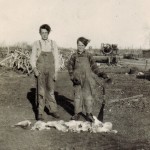 As young men, my dad and his brother, my Uncle Bill loved to do all the normal guy thins that most young men want to do, and hunting was right up there near the top, along with fishing, and pretty much anything that had to do with guns or dynamite, such as blowing a tree stump out of the ground, or sinking the front gate, and then fixing it before their mom found out. They were rough and rugged boys who, like most young men of those times, were growing up too fast. Times were hard, and families needed all the help they could get from all their children. Hunting was something families could do to supply food for their tables, and rabbits were always in abundance…then and now. Of course, for my dad and uncle, the guns were a cool as the hunting. They both loved guns and knew how to use them from the time they were little. Uncle Bill was hunting this particular day with a Mossberg, and my dad was using a 1906 Winchester.
As young men, my dad and his brother, my Uncle Bill loved to do all the normal guy thins that most young men want to do, and hunting was right up there near the top, along with fishing, and pretty much anything that had to do with guns or dynamite, such as blowing a tree stump out of the ground, or sinking the front gate, and then fixing it before their mom found out. They were rough and rugged boys who, like most young men of those times, were growing up too fast. Times were hard, and families needed all the help they could get from all their children. Hunting was something families could do to supply food for their tables, and rabbits were always in abundance…then and now. Of course, for my dad and uncle, the guns were a cool as the hunting. They both loved guns and knew how to use them from the time they were little. Uncle Bill was hunting this particular day with a Mossberg, and my dad was using a 1906 Winchester.
Like most boys, they had high hopes for their hunts. They were going to bag that big buck, or the most rabbits, or even bring in the most fish. I’m sure they competed against each other, 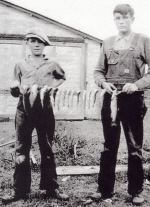 but I think that quite often, they pooled their resources and tried to beat the record they set the last time they went. Of course, nothing went to waste either, because that was not how things were done. The kills they made provided food for their family during those hard times of the great depression.
but I think that quite often, they pooled their resources and tried to beat the record they set the last time they went. Of course, nothing went to waste either, because that was not how things were done. The kills they made provided food for their family during those hard times of the great depression.
Though times were tough, I don’t really think my dad or his brother noticed it much, nor did their sisters really. Sure, they knew times were tough, and that everyone had to help out, but it was simply a way of life, and nothing they thought was so special. I guess that is pretty common with most people who aspire to do great things, whether it be heroic acts, service to country, or stepping up for family. Heroes come in all kinds of forms, and I’m sure that my dad’s family thought of their kids as heroes for all the help they gave them through the years.
 I don’t know how much of the Spencer genes, my cousins Gene, his son Tim, and even his grandson Daniel think that they have, but it’s possible that it’s more than they realize. Gene was a master carpenter, building beautiful furniture that anyone would be proud to own. In fact when I looked at pictures of the furniture Gene made, I wondered if he missed his true calling in life. Oh don’t get me wrong, because he was very successful, but that furniture…well, STUNNING doesn’t say enough!! Gene’s work was beautiful, and he passed that talent down to his son. Tim recently built a desk that is also quite beautiful, and shows that he has his dad’s talent. Daniel, while still a very young man, shows signs if that same talent for building things too.
I don’t know how much of the Spencer genes, my cousins Gene, his son Tim, and even his grandson Daniel think that they have, but it’s possible that it’s more than they realize. Gene was a master carpenter, building beautiful furniture that anyone would be proud to own. In fact when I looked at pictures of the furniture Gene made, I wondered if he missed his true calling in life. Oh don’t get me wrong, because he was very successful, but that furniture…well, STUNNING doesn’t say enough!! Gene’s work was beautiful, and he passed that talent down to his son. Tim recently built a desk that is also quite beautiful, and shows that he has his dad’s talent. Daniel, while still a very young man, shows signs if that same talent for building things too.
Their talent is definitely amazing, but where did that talent come from. Well, I don’t know about the Fredrick side if their family, but our grandpa, Allen Luther Spencer had talent in that 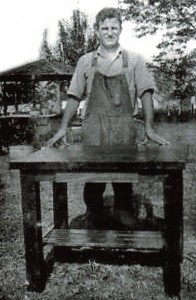 area too. I have never heard anyone talk about his abilities as a carpenter, and usually when we think of carpentry, we think more on the lines of building a house, but the finer side if carpentry is furniture making. I hadn’t really given much thought to the type of work my grandfather did for the railroad, but when I saw the picture of the table Grandpa built, I was reminded of an dependent card my dad had that said the his dad was a carpenter for the railroad.
area too. I have never heard anyone talk about his abilities as a carpenter, and usually when we think of carpentry, we think more on the lines of building a house, but the finer side if carpentry is furniture making. I hadn’t really given much thought to the type of work my grandfather did for the railroad, but when I saw the picture of the table Grandpa built, I was reminded of an dependent card my dad had that said the his dad was a carpenter for the railroad.
Having been a passenger on the 1880 Train in Hill City, South Dakota, I have seen the work of the railroad carpenters. They have transformed those old train cars from junk to a thing of beauty. The carpenters who work on the 1880 Train have done just that. Still, of all these people, I have to say that the ones who have perfected the art of carpentry the most, would be the Fredrick family…and I’m sure you will agree with me on that one.

